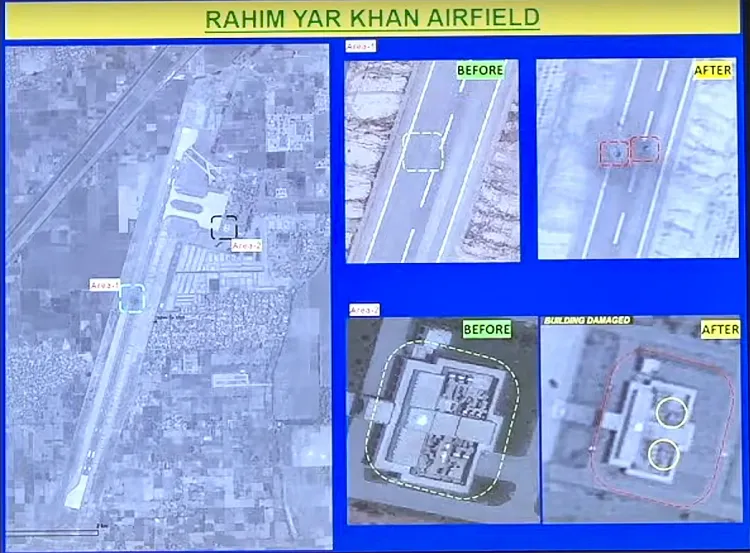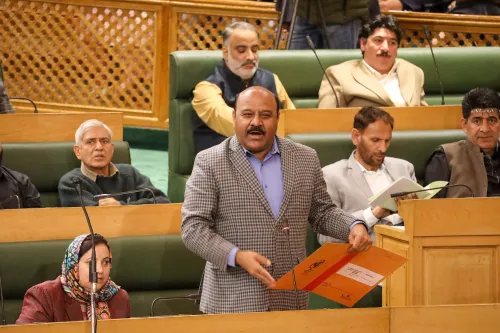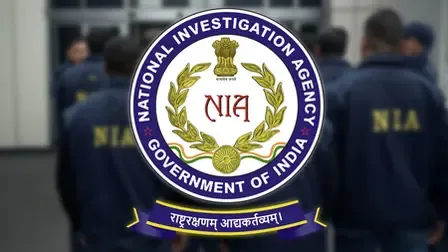How is Pakistan Surviving India's Military Prowess?

Synopsis
Key Takeaways
- Operation Sindoor showcases India's military and strategic capabilities.
- India's zero-tolerance policy towards terrorism is reinforced through military action and economic sanctions.
- Suspension of the Indus Waters Treaty could have severe implications for Pakistan's agriculture and economy.
- India's actions have significantly diplomatically isolated Pakistan on the global stage.
- Military precision was complemented by non-military measures to shape public perception and international opinion.
New Delhi, May 12 (NationPress) The charred portrait of Asif Ali Zardari amidst the remnants of the Rahimyar Khan air base stands as a powerful emblem of Pakistan's downfall, as Operation Sindoor showcased India's military and strategic capabilities through a combination of military and non-military strategies.
The extent to which Pakistan is being penalized is now abundantly clear.
This multi-faceted operation effectively neutralized terrorist threats, deterred Pakistani aggression, and reinforced India's zero-tolerance policy towards terrorism while ensuring strategic restraint and garnering international support.
On the military front, India executed a variety of precise military actions to meet its objectives.
The Indian Armed Forces conducted coordinated missile strikes on nine terrorist facilities, targeting four in Pakistan (including Bahawalpur and Muridke) and five in Pakistan-occupied Kashmir (such as Muzaffarabad and Kotli). These locations served as primary command centers for Jaish-e-Mohammed (JeM) and Lashkar-e-Taiba (LeT), notorious for attacks such as Pulwama (2019) and Mumbai (2008).
Following Pakistan's retaliatory drone and missile assaults from May 7-9 aimed at various Indian cities and military sites, India deployed kamikaze drones to dismantle Pakistani air defenses nationwide, including the air defense system in Lahore.
India's air defense mechanism was pivotal in neutralizing all incoming threats, resulting in minimal casualties or material damage while exposing vulnerabilities in Pakistan's HQ-9 system. The military actions on the nights of May 9 and 10 marked the first instance of a nation affecting the air force installations of a nuclear-capable country.
Within three hours, 11 bases were targeted, including Nur Khan, Rafiqui, Murid, Sukkur, Sialkot, Pasrur, Chunian, Sargodha, Skardu, Bholari, and Jacobabad.
The scale of devastation was starkly evident in the before-and-after images of the Shahbaz airbase in Jacobabad.
During the strikes, several ammunition depots and bases, such as Sargodha and Bholari, housing F-16s and JF-17 fighter jets were struck, resulting in a 20 percent reduction in Pakistan's air force infrastructure.
India's bombing of Pakistan's Bholari Air Base resulted in the deaths of over 50 individuals, including Pakistan's squadron leader Usman Yousuf and four airmen, alongside the destruction of Pakistan's fighter jets.
Throughout Operation Sindoor, India targeted numerous terror and military sites across Pakistan. Following artillery and mortar fire from Pakistan in the Poonch-Rajouri sector that endangered civilian areas, Indian forces responded with calculated counterfire, destroying terrorist bunkers and Pakistani army positions.
On the non-military front, India's non-kinetic strategies were equally crucial in influencing the strategic landscape and securing public and international backing. India effectively utilized strategic policy actions, information dominance, and psychological operations to economically and diplomatically isolate Pakistan while enhancing domestic preparedness and international support.
India's suspension of the Indus Waters Treaty (IWT) under Operation Sindoor represented a significant move with extensive implications. Pakistan, as the lower riparian, depends on the Indus system for 80 percent of its 16 million hectares of farmland and 93 percent of its total water consumption—sustaining 237 million people and contributing a quarter of its GDP through crops like wheat, rice, and cotton.
With only 10 percent live storage capacity (14.4 MAF) at the Mangla and Tarbela dams, any disruption in water flows poses a severe threat of agricultural devastation, food scarcity, water shortages in major cities, and rolling blackouts that could paralyze industries, including textiles and fertilizers. Such shocks could incite a broader fiscal and foreign exchange crisis in an already vulnerable economy.
For India, the treaty had historically limited infrastructural advancement in Jammu and Kashmir, confining it to run-of-the-river projects. Its suspension grants India full authority over western rivers like Jhelum and Chenab—opening avenues for new reservoirs, enhancing irrigation and hydropower in Jammu and Kashmir, Ladakh, Punjab, and Haryana, thus transforming a diplomatic instrument into a developmental asset.
By halting the treaty, India sent a clear message that water and blood cannot coexist.
India also closed the Attari-Wagah border and ceased all bilateral trade with Pakistan, terminating exports of essential goods such as onions and restricting imports like cement and textiles. This action severed the main land-based trade route between the two nations.
The suspension had immediate economic repercussions for Pakistan, already struggling with inflation and debt. By cutting off these economic lifelines without resorting to direct military confrontation, India reaffirmed its zero-tolerance policy while avoiding a full-scale conflict.
Additionally, India canceled the visas of all Pakistanis residing in India and repatriated them in the immediate aftermath of the April 22 Pahalgam terrorist attack, demonstrating a strong commitment against terrorism. The complete ban on Pakistani artists, halting performances, screenings, music releases, and cultural collaborations, extended to streaming platforms, effectively curtailing Pakistan’s cultural reach in India.
India successfully exposed Pakistan's terror ecosystem on a global level, diplomatically isolating Pakistan. These actions imposed substantial economic and diplomatic penalties. Collectively, these measures deepened Pakistan’s isolation while reaffirming India's dedication to a zero-tolerance approach towards terrorism.









